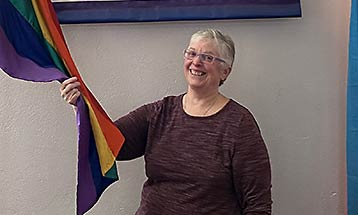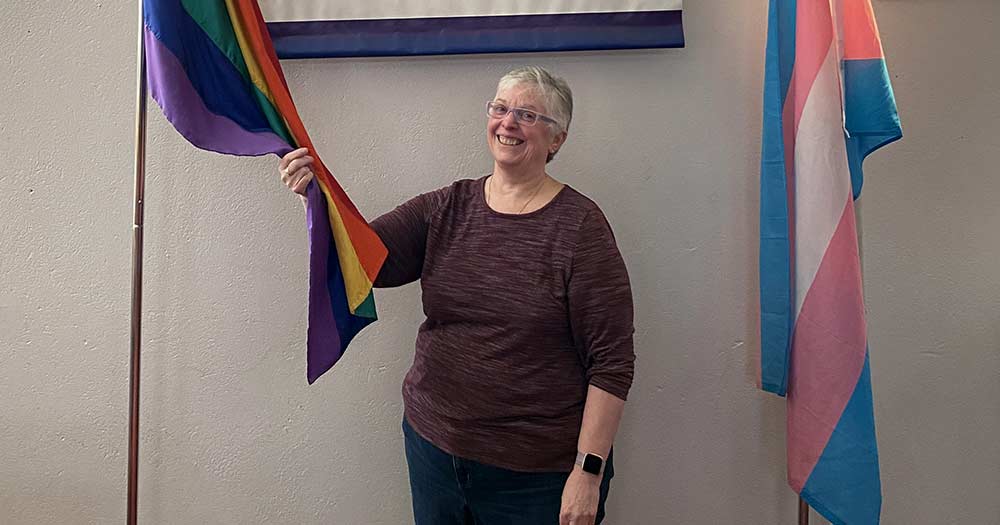Patti Gray loved her job in the Air Force, and she was very good at it too. She exceeded expectations, earned praise, and looked forward to a long, successful career—until the bigotry of the “LGBT purge” derailed her plans, forced her out of the Canadian Armed Forces (CAF) and left her unemployed during a recession, through no fault of her own.
Having served in the Naval Reserve after high school, Patti joined the CAF in 1979. She chose the Air Force, and after basic training, was assigned to be a supply technician at the air base in Chatham, New Brunswick.
As a 20-year-old private, Patti excelled at her job. She performed the work of a corporal and was put on an accelerated path for promotion.
Then one day, Patti was told that she was under investigation. Patti was subjected to deeply personal questioning about her sexuality and personal habits. Her commanding officer was supportive, at least. “He told me just to tell them I would change,” Patti recalls.
“It was horrible. They made you feel shame just for being who you were.”
She did not know it at the time, but she would soon learn that she had been caught up in the LGBT purge, when paranoia and bigotry sought every CAF member who might be LGBT and forced them out.
But Patti refused to lie, or to tell the investigators who else she knew that could be gay. She was honourably discharged in 1981, and told it was because she “could not adjust to military life,” but later learned she was in fact released as a “sexual deviant” under section CFAO 19-20.
Patti returned to her hometown of Windsor, Ontario, which was in a deep recession. “Unemployment was very high in Windsor at that time,” Patti says. She could find only part-time work with Bell Canada. “It was as little as a half-day a week,” Patti remembers.
She moved to Hamilton to find more sustained employment and found herself back at Bell—but at least now it was full-time.
“My career took off at that point,” Patti says. Over the years, she rose to be in charge of training and staff support.
She chose early retirement in 2012, settling in Toronto with her life partner, Cathy Brown. But soon, Patti realized she wanted to do more with her time. She found a job with the Blue Jays organization, which kept her in touch with the public—and let her watch baseball games for free.
But Patti never truly left her military career behind. “I really enjoyed my time in the CAF and I made a lot of friends there.” Neither did she forget the harassment she and other LGBT members underwent in the 1980s and after, and the harm they suffered. “Thousands of people were purged,” she says, despite their talent and hard work. “It left us with a horrible feeling.”
In 2017, Patti joined Rainbow Veterans of Canada, a group advocating for recognition and redress of the harm done by the LGBT purge. The group gathers each year on the eve of the National Remembrance Day ceremony. While Patti enjoyed the camaraderie and sharing, she wanted to do more.
She became part of the class action lawsuit for recognition of the gay purge and LGBT rights. In 2017, Prime Minister Justin Trudeau formally apologized to LGBT federal public servants, CAF and RCMP members harmed by federal legislation, policies and practices that led to the oppression of and discrimination against lesbian, gay, bisexual, transgender and two-spirit people in Canada.
“Seeing that, and hearing the Prime Minister apologize for the way we were treated, it felt like vindication ”
Last year, Lt.-Col. Cathy Potts became the first service member to lay a wreath at the national ceremony while wearing the new Pride Citation.
“Seeing that, and hearing the Prime Minister apologize for the way we were treated, it felt like vindication,” Patti remembers. “It meant a lot, but for some, it could never be enough. Thousands were purged, and many did not join the class action, because they felt it would be too hard to revisit that experience. It would bring back the anger and frustration we felt.”
Today, Patti enjoys her retirement and the camaraderie of being part of Rainbow Veterans of Canada. She also sings in a local choir and volunteers with an animal rescue agency in Toronto, transporting rescued cats to veterinarians and then to foster homes. “When we’re not in pandemic, I get to meet people who care about animals.”
“The COVID-19 pandemic kind of puts a freeze on everything, but it is very fulfilling.”
Listen and read more on how women and LGBTQ2 Veterans have played an important role in our country’s military efforts over the years and continue to contribute to its rich history and heritage.
Note: Rainbow Veterans of Canada was one of over 40 organizations that recently received funding from the Veterans Organizations Emergency Support Fund. The Fund helps recipients cover operational costs like rent, utilities, administration, and wages, allowing them to continue to deliver important services for Veterans and their families throughout the global pandemic.





